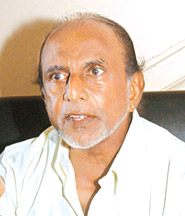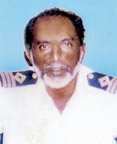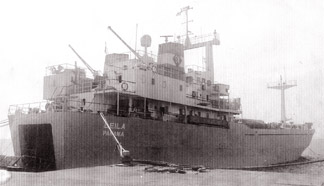Agony of Somali sea piracy
A victim recalls horrific experience:
Another ship seized:
By Manjula FERNANDO
| [Fact box] |
| * Somali Pirates seize
Panama-flagged cargo ship from a safety corridor - AHN| All
Headline News - Aug 2, 2010
* Egyptian managers of hijacked ship ready to
pay ransom - Reuters Africa - Aug 3, 2010.
* Saudi insurer ‘to pay pirates $20mln ransom’
- AFP - Aug 2, 2010.
* EU helicopter repels pirate attack in Gulf
of Aden - The Associated Press - Aug 3, 2010. |
|

Captain Werawansa despite his rare bravery has not received any
compensation let alone the salary for seven months by his Dubai
boss.
|

Pic: Chinthaka Kumarasinghe |
Capt. Sarath Weerawansa, 63, fought with the Somali lawless
administration for seven months to save his crew and his ship "Lo Lo
Leila" which was under illegal detention in Berbera from 15 September
2009 till 22 March 2010. His protracted fight which brought upon him
life threats and near death experiences has made him a fearless and an
outspoken about a subject which no other mariner would ever want to
speak of; How the seafarers being ill treated by their employers, sea
piracy and double standards of the international community in fighting
Somali pirates.
Q: Somali pirates have taken a Panama flagged cargo ship hostage on
Monday. Not so long ago you underwent the same experience at the hands
of Somali administration. What was your reaction to the latest news?
A: When I read about it I felt very sorry for the crew. I am not at
all shocked by the news. Of late, pirates in this stretch of sea have
become very active.
There are NATO ships patrolling this troubled area, American fleet
are there but still the Somalis managed to succeed. The million dollar
question is how they do it? Are they more intelligent or endowed with
sophisticated equipment than these joint forces. They are not!
Of course, these pirates are fully backed by Al Qaeda and other
regional terror groups. But, that is not the only reason. I think the
"stake holders" have resolved to keep mum on the whole issue for reasons
best known to them. Somali pirates can be stopped, if you really have
the wit and the will.
Somalia became a lawless land of sea piracy over a decade ago. The
international community and the UN have not done anything to correct
this historical flaw.
Q: If I am correct this was the third such hijack of a merchant
freighter with Sri Lankan crew on board, within the last 18 months? Do
these pirates regard some ships as soft targets?
A: Yes. They don't attack all the vessels. Dubai based ships, in
particular, are considered soft targets. The European principals are
difficult to negotiate and to make transactions with.
|

The ship “Lo Lo Leila” now in the hands of Somalis |
The pirates come in wooden Dhow boats with 15m - 25 m perimeter, same
as those used by Pakistanis and Indians for trade in close waters.
Despite outer appearance these boats have a lot of capacity to carry
fuel and weapons. There are rubber dinghies and fibreglass boats
attached to them. They linger in the high seas, posing as fishermen or
merchants, during the day time.
When a vessel sets sail from a harbour towards the pirate territory,
their henchmen tip off their counterparts in the Gulf of Aden.
When ships plying from Europe to Asia pass the Suez and enter the red
sea, the pirates, get the message. They wait in ambush. The ships from
the Gulf region will be monitored at the point from Strait of Hormus.
Then, armed with AK-47s and RPGs, they attack and seize merchant
vessels in mid sea and tug them to secret locations in the vast Somali
coast.
Q: What will happen if the principals refuse to pay the ransom? Has
there been incidents of killing crew members over such refusals?
A: I have had first hand experience. They are so ruthless they do not
hesitate to kill. When I was under their so called `arrest' late last
year, sea pirates killed the captain of another ship a Syrian national.
He was brought to the bridge of the ship and his throat was slashed.
From what I heard later was that he had a bitter argument with them.
This was not the first and the last.
A friend of mine, a Sri Lankan had a similar experience. He was an
engineer with a Somali-flagged ship. When these pirates had hijacked a
sister vessel, its owner had organised a rescue mission. My friend was
to help his Captain to sail their ship, confront the pirates and force
them to release the hijacked ship. Knowing the ruthlessness of these
pirates he had refused, resigned and returned home.
When the particular ship ultimately sailed on its rescue mission, the
pirates had brought the captain of the seized ship on to the bridge and
threatened to kill him if they dared to come near. When the rescue
mission failed to take orders the Pakistani Captain of the hostage ship
was shot in the head point blank. This had happened few days after our
release.
If the ransom attempt fails, the Somalis sometimes release the crew
and retain the ship. They change its colour, flag and the name. They are
masters in disguise. Those ships are used for `trade' between Yemen and
Dubai.
Q: How do they treat their hostages?
A: I was not a victim of hostage-taking by pirates. I was kept under
detention by the so called Somali port authorities. There is no law
governing this country and therefore, hardly there as any distinction
between pirates and the officials.
During my lifelong career I have listened to many pirate tales from
the victims. Once a ship is seized by pirates it will be delivered to
another party. The pirates who seize the ship will depart after
collecting their dues. The negotiations for the ransom and the detention
of hostages are handled by a different group.
The crew will be held in `the mess' which is a large open hall. They
will have to eat and sleep there. Even a visit to the wash room will be
allowed only with an armed escort. The cook will be released to attend
to the kitchen but he too will be monitored closely.
It is mental torture as you have to constantly live in fear and
uncertainty.
Q: Don't you think the payment of ransom will set the scene for an
additional pirate ship in sea?
A: Certainly, but once they have captured a ship there is no way out
unless through negotiations. They are ruthless killers.
The Indian and Chinese national freighters are very tough with the
pirates because they are equipped to retaliate. You cannot go soft on
these maritime criminals. Last year some of the pirates were killed in
such a confrontation.
Q: It seems that these pirates are well organised and well informed.
Where can you begin the counter action?
A: The criminals from Yemen and Aden shelter these pirates. Their
weapons suppliers are mainly Yemenis and fuel is got from some friendly
countries in the Gulf region.
During the 70s and 80s, the Phillip Channel and the straits of
Malacca were extensively used by the Abu Sayyaf guerrillas of
Philippines and Indonesian pirates who were supported by some of
Indonesian gangs and Malaysian insurgents.
We used to carry on board additional crew to be on the look out for
these pirates. Many precautionary measures were taken by the ships
plying on this route in the past. Due to Malaysian and Singaporean
Government's stern and concerted efforts to apprehend and deal with them
severely, the sea piracy has come to almost a halt. The Nigerian pirates
which were operating in the 70s to 90s, were also dealt with in the same
way.
You must fight fire with fire.
Sea piracy has become a very lucrative job and an easy money spinner
for Somali youngsters. Their taking up to this unscrupulous trade is
very much on the incline. You find pirates as young as 16 upto 40 years
of age.
Q: How was your personal experience with the Somalis?
A: I was detained by the Somali administration. My sister ship, "Mariam
Star", that called at Berbera, Somalia with some cargo, caught fire
inside the harbour. I was asked to go there and assist her. When I
reached the port the crew of my sister ship had been arrested by the
Somali Government. The same fate befell me. The Somali state authorities
who work hand in glove with the pirates demanded US $ 2.5 million from
my owner in Dubai as compensation for the lost cargo in "Mariam Star".
Till then we were to be detained. The ship's owner refused to pay and
left it at that. I had to look after the crew of "Mariam Star" as well
as mine.
Words cannot explain the suffering we underwent at their hands. The
struggle for food and water was pathetic. When days turned into months
our hopes of rescue waned and we became delirious with fear. I fell
acutely ill and there were times when I thought my end was very near.
My colleagues on the other ship were brutally assaulted and I too was
threatened with life for my efforts to secure our release. With the help
of some outsiders I established contact with the international media.
This move outraged the Somali authorities.
I was thoroughly neglected by the ship's owner Dubai based business
tycoon. My salary was not paid. My family was in distracts. After the
first month supply of food, fresh water and fuel to run the ship's
generator that supplied electricity for cooking, were stopped.
Finally, due to untiring efforts by a gentleman from the IOM and the
Sri Lankan mission in Nairobi we were freed in March 2010, seven months
after our illegal detention. With the timely intervention of the then
Foreign Minister Rohitha Bogollagama our airfare too were taken care of
by the Government.
Despite my efforts to keep the crew and the ship safe till the day we
were rescued, my employer never paid me compensation or the salaries due
for the seven month period in detention. The two Pakistani crew members
of my ship got their dues on arrival in Karachi.
I am 63 now. My salary was my family's only means of sustenance.
The Consular section of the Foreign Ministry and an official of the
Presidential Secretariat have been assisting me a lot but unfortunately
the efforts of the Dubai mission which should pursue the case at their
end to put pressure on my employer, had been highly unsatisfactory.
I hope the President and the Foreign Minister will intervene and
resolve the issue soon. |

